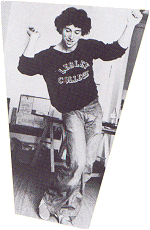Someone I Care About | |
 | I first heard Jonathan Richman back in '82. It was when I was sharing a tiny one-bedroom flat in South East London with my friend Aggi. Every evening after work, I would rush home to paste down some more Girls Annual illustrations among enthusiastic words about the Go-Betweens and early Creation acts like Mod acolytes Jasmine Minks and the psychedelic Byrds-ian Revolving Paint Dream for my fanzine The Legend!, using spray mount borrowed from my work-place. (I was a silk-screen printer.) Aggi studied fine art at Camberwell College just up the road. Not owning a television, evenings were either spent listening to the cool UK acts of the day (Undertones, Soft Cell, Orange Juice) or pretending to write the odd song. I had a fledgling career as a shy, unobtrusive songwriter back then, you see - writing songs which, in retrospect, were quite alarming in both the directness of their sentiments and lack of melody. The bond which linked myself and Aggi was very simple - we were both major fans of her boyfriend Stephen's band The Pastels, who, back then, were a wonderfully naive, Postcard-influenced, jangling pop band. I couldn't resist Stephen's deep, affected, off-key voice, nor Brian's carefully spelt out guitar solos. It seemed that The Pastels spoke directly to me, and to me alone. The honour was reciprocated: the Pastels were some of the very few people who've ever liked my songs. One weekend, Stephen came to visit. Among other things, he had a tape of Jonathan Richman singing live with him. "Here, listen to this Jerry," he said, handing me the cassette. "He really reminds me of you. The way he sings with only the barest of accompaniments. The directness of his love songs. His naivety. The way most people don't understand him. He's a big influence on The Pastels, too. I think you'll really like this." So I listened. Stephen was being way too kind, of course. Yes, there were distinct similarities between the unadorned simplicity of Jonathan's songs and my own - the way neither of us seemed to much like the dull thunderous roar of drums and electric guitars obscuring our songs, although both of us were definitely in love with rock'n'roll - but that's about where it ended. Jonathan had such a voice, such a way round a low key melody and turn of emotive phrase. When he sang, it seemed like you could hear the tinkle of magic from somewhere outside the grimy windows and grey skies, the promise that not all pop stars were arrogant, self-loving bores. When he sang, it suddenly made it OK to be male and over-sensitive, it was fine to find beauty in the insignificant details. I listened spell-bound as this American who seemed so fragile, so special, sang tales of being scorned by girls and hipsters alike in his home of Boston, Massachusetts - accompanied by nothing more than a very sparse acoustic guitar, and occasional applause. I can remember the songs he played even now; 'New England', 'Astral Plane', 'Government Center', the life-enriching 'The Morning Of Our Lives'... Songs which all intoxicated in their gentle grace, their joyous, naive rush of sympathy and solace. Most especially, however, there was 'Don't Let Our Youth Go To Waste', Jonathan's plea from the other side of the generational divide, which the man sung a capella - stark, chilling and very, very moving. I have never forgotten that experience, hearing Jonathan Richman for the first time. I last heard Jonathan Richman in '98. I was living in Seattle and, against my better judgement, went along to see the smash hit kooky comedy There's Something About Mary. The film was pretty good actually - but my biggest pleasure in watching it was when I saw my very own gentle genius strolling along between scenes, playing guitar, acting as the singing narrator, still as charming, winsome and naive as he's always been. Just because he sings quietly doesn't mean you should under-estimate him. Jonathan Richman is one of the giants of rock'n'roll. © Everett True 1999 |